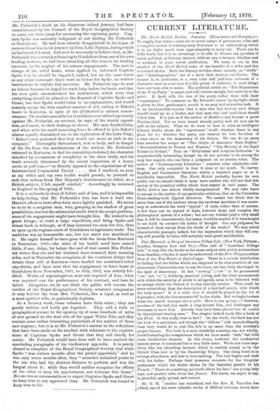CURRENT LITERATURE.
The North British Review. January. (Edmonton and Douglas.)— To supply four times a year six or seven essays of permanent value and a complete review of contemporary literature is an undertaking which it is no slight merit even approximately to carry out. There can be little doubt that it is an advantage to be able to discuss any question of social, political, or literary interest, without any reference, whether real or nominal, to some recent publication. We seem to see in this nnmber of the North British some of the benefits of a wider and less restricted choice. Both the literary articles, those, namely, on "Swift" and "Autobiographies," are of a more than average excellence. The former is, in particular, is a very calm and judicious estimate of a character such as even men of a fine power of criticism in such things have not been able to make. The political article on "The Repentance of the Tory Party " is smart and well written enough, but scarcely to the point. It deals with the sins of the party, rather than with their " repentance." To comment on Mr. Disraeli's career by the light which is given by that gentleman's novels is an easy and attractive task. It is an inexhaustible wonder that a man who had written such things should stand up as a leader, and that men who had read them should follow him. It is just as if the author of Hudibras had become a great Puritan chief. Yet we have heard already pretty well all that can be said on the subject. What we do want to bear is what an intelligent Liberal thinks about the " repentance " itself ; whether there is any place for it; whether the party can resume its true function of a wise check on the democracy of the future. We can do no more than mention the essays on "The Origin of American State Rights," " Decentralization in France and Prussia," "The History of the Land Tenure in Ireland." That on "Babylonian and Assyrian Libraries " is unquestionably interesting, though we do not pretend to be among the very few experts who can form a judgment on its precise value. The review of " Contemporary Literature " contains some admirable criti- cism. Our only complaint is that it aims at too much. To survey English and Continental literature within a hundred pages or so is manifestly impossible. The North British probably knows its own public, but we should think it must have readers who will not find this survey of the practical utility which they expect in such pages. The Belles Lettres are almost wholly unrepresented. We may take leave to except to the justice of one particular criticism, that on the Clarendon Press reading-book Typical Selections. We cannot but think that in more than one of the authors whom the reviewer mentions it was neces- sary to understand the word " typical " of style rather than of matter. A few lines can be typical of style, however large and complex the philosophical system of a writer; but not one volume (and a very small one, it will be remembered), but many, would be needed, if it were sought to set forth by extracts his habits of thought. Can any judgment be formed of these except from the whole of the works? Wo may select characteristic passages, indeed, but the impression which they will con- vey will possibly be false, will certainly need great modification.


































 Previous page
Previous page